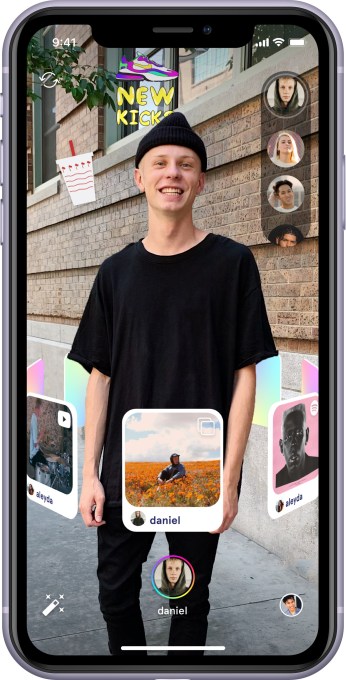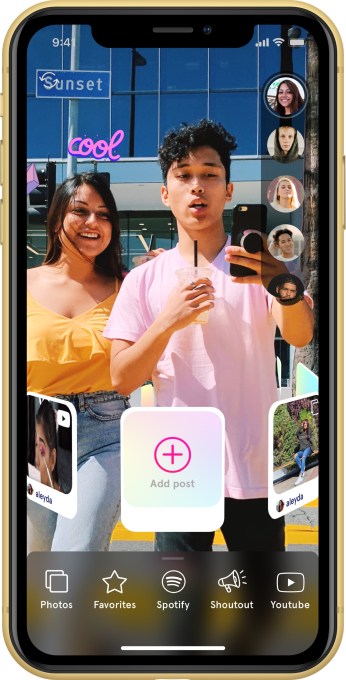Octi has created a new social network that uses augmented reality to connect the act of seeing your friends in real life with viewing digital content like their favorite YouTube videos and Spotify songs.
When I wrote about the startup in 2018, it was building AR technology that could do a better job of recognizing the human body and movement. Last week, co-founder and CEO Justin Fuisz (pictured above) told me that this was “a really cool feature,” but that Octi’s investors pushed him “to do more, go deeper.”
Speaking of those investors, the startup says it’s now raised $12 million in funding (including a previously announced seed round of $7.5 million) from Live Nation, Anheuser-Busch InBev, Peter Diamandis’ Bold Capital Partners, Human Ventures, I2BF, Day One Ventures, Tom Conrad, Scott Belsky and Josh Kushner.
Last week, Fuisz demonstrated what he now sees as Octi’s “mic drop” moment — opening the new app and pointing his iPhone camera at a colleague. The app quickly recognized her, allowing Fuisz to send her a friend request. And once the request was accepted, could Fuisz look at her through the camera again, where she was surrounded by a floating “belt” of virtual items that she’d created with videos, songs and photos.

Octi also allows you to include fun effects and stickers. Your friends can change your profile too, making you wear a funny hat or giving you a rousing theme song for the day.
To create a facial recognition experience that’s fast and simple, Fuisz said that Octi’s powered by a “neural network on the edge,” allowing the app to process images on the device (rather than uploading them to the cloud) in a privacy-friendly way.
He said the company has taken other steps to optimize the process, like prioritizing friends-of-friends rather than searching through the faces of everyone in the network, resulting in an app that can identify a friend in as little as 20 milliseconds.
While Octi allows you to view friends’ profiles remotely, it’s worth emphasizing that the core experience is meant to be in-person. In fact, the company provided a statement from analyst Rich Greenfield in which he described the app as “an impressive technology that gives teens a compelling reason to be present and communicate with their phones, while gathered with their closest friends.”

I wondered whether a new social dynamic also provides new opportunities for harassment and bullying, but Fuisz noted that for now, Octi profiles and belts are only visible to friends that you’ve approved. So if one of your connections is doing something you don’t like, “You just say goodbye. That’s it. That’s a simple way of dealing with it.”
Fuisz added that this initial version provides a foundation for many more experiences: “There’s endless opportunity for games and other fun things you can do.”
Ultimately, he’s hoping to turn this into a WeChat-style platform for outside developers to build social tools and content. And since Octi works on iPhone 7 and above (with plans for an Android version later this year), it can potentially reach an enormous audience out of the gate, rather than facing the scale issues of a more specialized AR or VR hardware platform.

Recent Comments